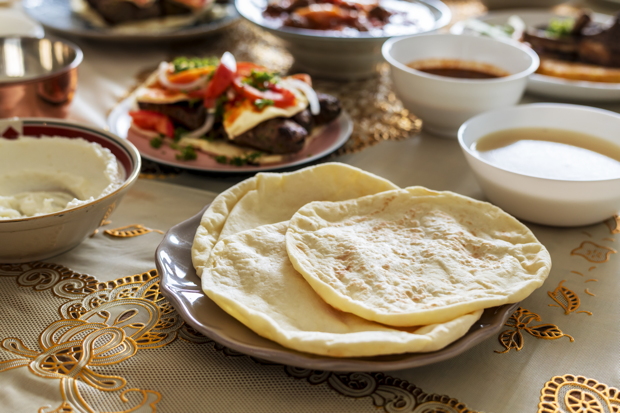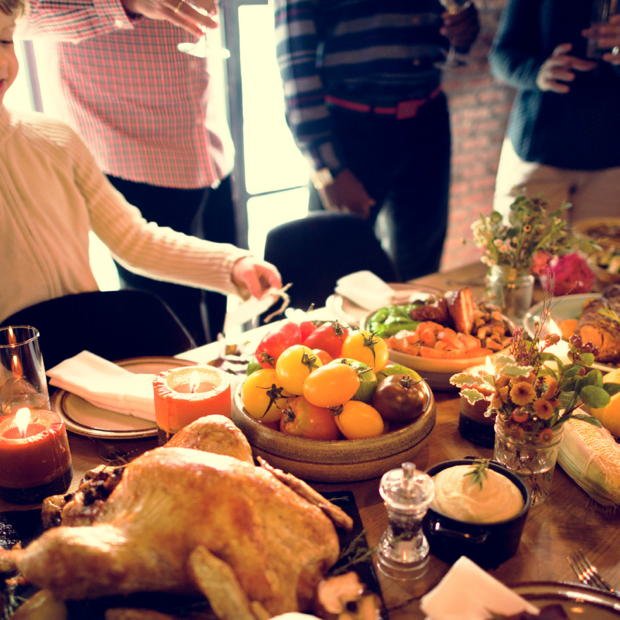
Sharing a meal is a universal gesture of hospitality. Meals are, after all, the occasions filled with our favorite food and traditions. (My stuffing is a classic family recipe made with white bread, not cornbread, by the way.) Holidays provide an easy door into interactions about food, family, culture, and values and a natural way to talk about our relationships with God, whether it’s in expressing our gratitude at Thanksgiving or celebrating the birth or resurrection of Jesus at Christmas and Easter.
Opening one’s home to others at Thanksgiving (and other holidays) takes a bit of forethought and planning, but needn’t be left to those who have Gifts of Hospitality. Inviting others to bring food — maybe something important to their own family or culture — can remove some of the preparation burden and enable them to feel involved and important. The focus should be on hospitality — welcoming the guest — as opposed to entertaining and calling attention to the host. Rather than being concerned about protecting “family time,” including folks in our holiday celebrations has enriched our lives. Our children have seen hospitality in action and have been the recipients of lots of attention from visitors. They have learned at an early age that a full house at Thanksgiving with the sounds of non-English phrases and lots of laughter was more fun than fighting with each other or watching football on TV. Inviting others to join us at our family table is a tangible way we’ve found to demonstrate the love and kindness of our hospitable God who has lavishly welcomed us in Christ. And we have been enriched in the process.
I’ve had many experiences of holiday meals over the years. I grew up in a house regularly filled with guests, whether for a meal or for a semester. My parents always found students or neighbors to invite over. When I joined InterVarsity staff and moved into my own place, it was natural to host students (even as a single woman) for meals, movie nights, and parties.
Working with international students, I discovered that many come to the States for school and return home without ever having seen the inside of an American home. Graduate students tend to be on campus year-round; their work commitments and/or being far from home make for infrequent visits to family. Thanksgiving, particularly, became a focal point of ministry as I welcomed students into my home for a traditional American celebration.
In those years, I cooked two turkeys and prepared two meals, hosting my mom and siblings at noon and then pushing them out the door by 4:00 so I could clean up and be ready for a houseful of students and Meal Number Two at 5:00.

A decade later, I was married and living in Georgia with young children — and our "international Thanksgiving" became an all-day affair. We’d go late into the night, pulling out desserts and leftovers as we worked on jigsaw puzzles or played multiple rounds of Pit (both are great options for folks who may be uncertain in their English). I used to tell the American students that, if I discovered they or their lab mates had spent the day in the lab, they would be in trouble!
In recent years, my work has taken me away from a local campus and we have begun hosting the international interns from my husband’s office. We continue to enjoy the conversations and laughter. We love providing a warm and welcoming space, offering a feel of “family” to those whose own families are so far away. More than once we have received tearful thanks from guests whose experience in our home took a bit of the sting out of not being with their own families over the holidays. Our holiday gatherings certainly don’t resemble Martha Stewart’s and sometimes conversations have been slow or awkward, but we’ve seen God’s gift of welcome and belonging at our tables with mismatched folding chairs, turkey and kimchee, and new and old friends.
Karen’s Top Five Tips for Holiday Hospitality
1. Invite people! Welcome someone you may not know well but might be grateful for a place to be, either in place of a distant family or as an introduction to American holidays. Pray for eyes to see those you could invite. One year I invited an elderly women I had befriended at the local gym. She was from Germany. Her husband was a G.I. and had met her there in WWII. They were delightful and he ended up being an expert carpenter — and he took a chair of mine home with him to fix!
2. Ask questions and engage. If this doesn’t come naturally to you, you’ll want to think about this ahead of time. Here are a few questions that I always ask:
- Where is home? Where did you grow up? Tell me about your family — siblings? parents? traditions?
- What do you do now (job, school, etc.)? What do you like about what you do?
- If you are inviting internationals, ask about their experience in the US. What’s been fun? What’s been hard? What do they miss about home?
- If they bring food that is connected to their home or culture, have them tell you about it — when it’s served, how it is prepared, etc. I also like to get folks talking about food and what foods they miss from home, if they are good cooks, and what they eat at holiday celebrations.
3. Focus on enjoying each other. Choose games that are easy for tentative-English-speakers to participate in. Jigsaw puzzles are great, especially for introverts.
4. Allow people to bring food. Most will either ask or show up with something. It’s fine if your skills do not include cooking. Many grocery stores now offer entire prepared Thanksgiving meals, so you don’t even have to know how to cook a turkey. Hospitality doesn’t mean your home needs to look like a magazine spread — it can just be your home. Make sure there are enough chairs, buy a stack of industrial-strength paper plates, and pull out your favorite games.
5. Be open to God's leading. Don’t underestimate the positive spiritual impact that opening your home and including others can have on your own kids. Be careful of the subtle temptation to idolatry around holiday times to make it all about your family. This often leads to other problems like exclusion, unrealistic expectations, over-the-top celebrations, and calendars that are too full to be healthy.